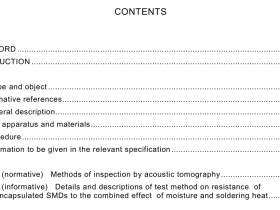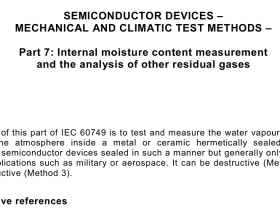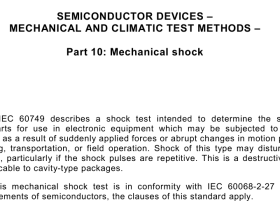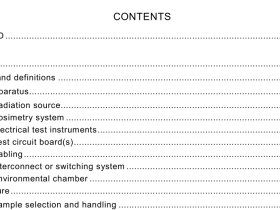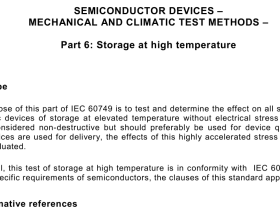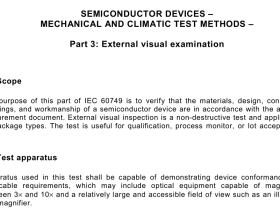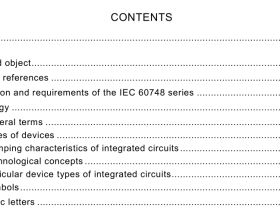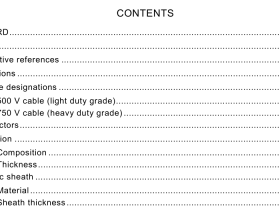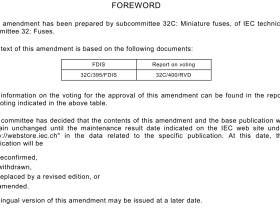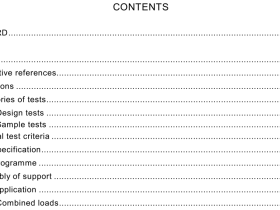IEC 60370:2017 pdf download

IEC 60370:2017 pdf download.Test procedure for thermal endurance of insulating resins and varnishes for impregnation purposes – Electric breakdown methods
1 Scope
This International Standard covers methods of test for the determination of thermal endurance (temperature index) of electrical insulating resins and varnishes for impregnation purposes. It is done by means of impregnating glass cloth and measuring electric strength or breakdown voltage before and after heat ageing. It covers the materials described in IEC 60455-3-5 and IEC 60464-3-2 and similar materials.
2 Normative references
The following documents are referred to in the text in such a way that some or all of their content constitutes requirements of this document. For dated references, only the edition cited applies. For undated references, the latest edition of the referenced document (including any amendments) applies. IEC 6021 2, Standard conditions for use prior to and during the testing of solid electrical insulating materials IEC 6021 6 (all parts), Electrical insulating materials – Thermal endurance properties IEC 6021 6-4-1 , Electrical insulating materials – Thermal endurance properties – Part 4-1: Ageing ovens – Single-chamber ovens IEC 6021 6-4-2, Electrical insulating materials – Thermal endurance properties – Part 4-2: Ageing ovens – Precision ovens for use up to 300 °C IEC 6021 6-4-3, Electrical insulating materials – Thermal endurance properties – Part 4-3: Ageing ovens – Multi-chamber ovens IEC 60243-1 , Electric strength of insulating materials – Test methods – Part 1: Tests at power frequencies IEC 60455-3-5, Resin based reactive compounds used for electrical insulation – Part 3: Specifications for individual materials – Sheet 5: Unsaturated polyester based impregnating resins IEC 60464-3-2, Varnishes used for electrical insulation – Part 3: Specifications for individual materials – Sheet 2: Hot curing impregnating varnishes IEC 60641 -3-1 , Pressboard and presspaper for electrical purposes – Part 3: Specifications for individual materials
3 Terms and definitions
For the purposes of this document, the following terms and definitions apply. ISO and IEC maintain terminological databases for use in standardization at the following addresses: • IEC Electropedia: available at http://www.electropedia.org/ • ISO Online browsing platform: available at http://www.iso.org/obp 3.1 resin mixture of a reactive polymer with other reactive components such as hardener accelerator, inhibitor or reactive diluent, and with or without filler and additives, whereby virtually no volatile matter is released during the subsequent curing reaction Note 1 to entry: Resins are solvent free. Note 2 to entry: Small quantities of by-products can be evolved during the cure of selected resins. In the case where a reactive diluent is used, small quantities of monomeric diluent can evaporate during cure manly due to the application conditions used. 3.2 varnish solution or emulsion of one or more resins in a solvent or carrier liquid Note 1 to entry: Other components may be present, such as driers, catalysts, reactive diluents, dyestuffs, pigments or co-solvents. Note 2 to entry: The solvents and by-products are released during the drying/curing process and at the same time the active components are polymerized and/or cross-linked forming a solid product.
4 Methods of test
4.1 General In these test procedures, specimens are aged in ovens at elevated temperatures for specified periods. The specimens are then removed from the oven, cooled and tested electrically. At each temperature the thermal life is determined as the ageing time necessary for the electric property to decrease to a preselected value. This value may be selected on the basis of some functional characteristic of the material for the intended application. The thermal endurance is then determined as a curve showing the relationship between ageing temperature and thermal life. Two alternative methods are given: – Method 1 : a curved electrode system designed to elongate the outer surface of the varnish specimen of approximately 2 %. This simulates flexing to which the varnish may be subjected in service. The property measured is electric strength, the end point criterion is 1 2 kV/mm. – Method 2: a ball to plate electrode arrangement is used to avoid mechanical stress. In many cases, the specimens are no longer plan after ageing and a curved electrode system or a plate to plate arrangement is causing additional undefined mechanical stress. The property measured is breakdown voltage, the end point criterion is 3 kV.
